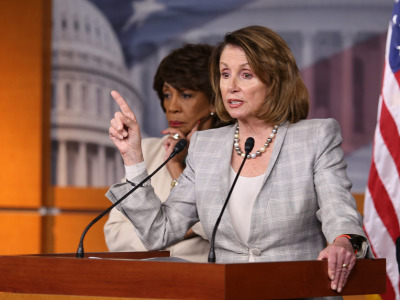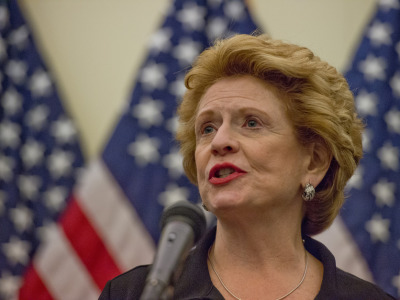For the second straight year, Democrats threatened but ultimately backed down from blocking Agriculture Secretary Sonny Perdue from getting a fresh pot of money to make payments to farmers this fall.
Despite warnings from farm groups that USDA was close to running out of money in the Commodity Credit Corp. account, House Democrats released a stopgap funding bill on Monday that didn’t include a replenishment of the CCC, charging that the Trump administration was using the account as a “political slush fund” to help the president's re-election bid in farm states.
But House Speaker Nancy Pelosi, facing appeals from some members of her own caucus, announced a deal with congressional Republicans and Treasury Secretary Steven Mnuchin Tuesday evening to refill the CCC in exchange for prohibiting the use of CCC funds for oil company assistance and extending some pandemic-related nutrition assistance.
The prohibition on payments to refiners, something Perdue said he couldn’t legally do anyway, includes an exemption for biofuels. Industry officials offered varying interpretations Tuesday evening on whether that could give USDA legal authority to make direct payments to ethanol producers; Perdue has said he doesn’t have the authority to provide aid to ethanol producers or other processors.

House Speaker Nancy Pelosi
According to sources, Democrats wanted provisions in the continuing resolution that would require USDA to consult with Congress before using the account for special farm assistance. A coronavirus relief package called the HEROES Act that the House passed in May included a requirement that USDA notify the House and Senate Agriculture committees at least 90 days before starting new aid programs. A GOP source close to the talks said House Democrats were pushing Tuesday to have that and other HEROES Act restrictions on CCC added to the CR.
Senate Agriculture Committee Chairman Pat Roberts, R-Kan., resisted including any such consultation requirements in the continuing resolution, saying they would have improperly tied the secretary’s hands. “It’s a dangerous precedent. You’re asking four people (leaders of the Ag committees) to sign off on the decisions that the secretary makes. … You’re just opening up the farm bill again.”
The committee's top Democrat, Debbie Stabenow of Michigan, said the agreement would block the "administration’s misguided plan to give hundreds of millions of dollars of agriculture funds to oil companies. I remain concerned about persistent unfairness in ad hoc USDA payments and I will continue to provide strong oversight to ensure that every dollar is distributed to the farmers who need it the most during these challenging times.”
The bill, which passed the House Tuesday night, 359-57, would keep the government funded until Dec. 11, avoiding a government shutdown when the new fiscal year starts Oct. 1.
In September 2019, House Appropriations Chairwoman Nita Lowey, D-N.Y., had considered omitting the CCC replenishment from a continuing resolution, potentially slowing the disbursement of Market Facilitation Program payments, a trade assistance program fund through the CCC, but Democratic leaders ultimately relented.
The agreement Pelosi reached with Republicans on Tuesday would extend for one year a program, known as Pandemic EBT, that allows states to provide meal-replacement benefits to families who attend a school that’s closed and would otherwise receive free or reduced-price meals. The program, authorized by Congress in March, is set to expire Sept. 30.
According to an estimate provided by a Senate GOP source, the CCC account will be down to $1.7 billion on Oct. 1 without action by Congress. That estimated balance doesn’t count the $14 billion set aside for the second round of Coronavirus Food Assistance Program payments, for which enrollment started Monday.
USDA is expected to have to make about $15 billion in payments during October, November and December, including $6 billion in marketing assistance loans, which farmers often seek in the fall so they can keep their crops in storage until market prices improve in later months.
USDA made about $7.6 billion in marketing loans in fiscal 2019, with about $7.5 billion repaid paid during the year. The largest share of those loans, about $2.1 billion, went to cotton producers.
Commodity program payments due to be made in October are expected to total about $8 billion. The estimate includes the cost of special seafood assistance that Perdue announced recently as well as Price Loss Coverage, Agriculture Risk Coverage and Conservation Reserve Program payments.
An additional $2.6 billion is due to be transferred to the Natural Resources Conservation Service to provide assistance under a variety of other programs, including the Conservation Stewardship Program and Environmental Quality Incentives Program.
Interested in more coverage and insights? Receive a free month of Agri-Pulse West.
An estimated $650 million is due to go out through nearly smaller programs, ranging from disaster assistance to farmers’ market support and organic research.

Sen. Debbie Stabenow, D-Mich.
The American Farm Bureau Federation said in a letter to lawmakers on Tuesday saying that the CR Democrats released Monday without the CCC replenishment would cut off “a critical lifeline of support to the agricultural community. … This bill would effectively shut down many USDA programs, including conservation, risk management and rural development, as well as supplemental funding for nutrition programs.”
Majority Leader Mitch McConnell, R-Ky., told reporters Tuesday afternoon that the CR sent “a message to farm country to drop dead.” Senate GOP Whip John Thune, R-S.D., was a "really bad decision for them (Democrats) politically.”
Stabenow argued USDA could adequately manage the account to dispense the CFAP-2 payments as well as the farm program payments. She noted the CCC account would be automatically replenished when the USDA’s files the financial accounting for fiscal 2020, likely in November.
"I just want accountability," Stabenow said Monday during the annual Agri-Pulse Ag and Food Policy Summit. "I want to know it (CCC funding) is going where it needs to go. I want to know our farmers in Michigan and across the country are getting the support they need."
Echoing Stabenow’s concerns, Sen. Tammy Baldwin, D-Wis., on Tuesday told Agri-Pulse, “There’s not a lot of transparency and granular oversight of the handling of the program thus far. I’ve certainly heard concerns about farmers who are not seeing the sort of assistance to get through these struggles compared to others.”
Download the CR text here.
Ben Nuelle contributed to this report.
For more news, go to www.Agri-Pulse.com.


